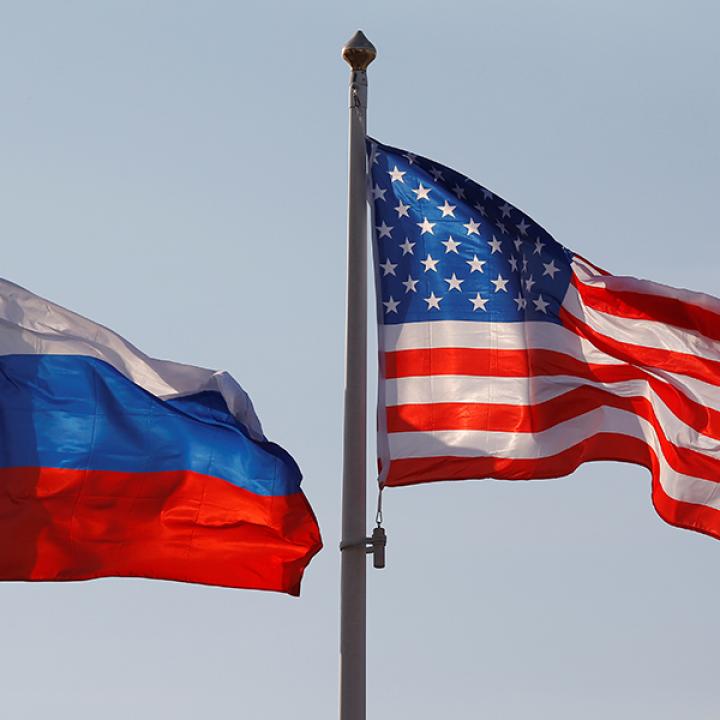
- Policy Analysis
- Policy Alert
Russia Signals Biden with Attack on Syrian Jihadist Group

Washington is no ally of HTS, but it should realize that Russian strikes against the group are aimed squarely at foiling U.S. objectives in Geneva, including the effort to maintain cross-border aid.
On June 10, Abu Khalid al-Shami, the military spokesman for Hayat Tahrir al-Sham (HTS), was killed in the Syrian village of Ablin. He and two other officials with the leading jihadist group in Idlib province—military media chief Abu Musab al-Homsi and senior commander Muataz al-Nasr (Abu Tamir al-Homsi)—died while responding to Russian airstrikes that killed up to thirteen individuals, including women and children.
The incident should be viewed within the context of UN negotiations between the United States and Russia over maintaining cross-border humanitarian aid into territories outside the Assad regime’s control. By killing HTS leaders, Vladimir Putin appears to be sending President Biden two messages ahead of their scheduled June 16 meeting in Geneva: (1) Idlib is still run by a US-designated terrorist group, so providing humanitarian aid to that area is unnecessary; (2) Nothing Washington does will change the fact that Russia holds all the military leverage in Syria and continues to pursue its policies from a position of strength.
Who Was Abu Khalid al-Shami?
Local news outlet Syria TV released previously unpublished details on Shami’s biography. Although his relatives would not provide his real name due to security concerns, it is known that he hailed from Jisreen village in the East Ghouta region and at one point went by the name Abu Khalid Jisreen. Prior to the 2011 revolution, he worked in a local sewing factory before moving to Saudi Arabia for work. He reportedly returned home in March 2011 to join the demonstrations in his hometown alongside the Jisreen Local Council.
Shami later shifted to the military fight, taking part in many key battles around East Ghouta from 2013 to 2017. Originally he was a member of Liwa al-Qaqa bin Umru al-Tamimi, which was part of Ittihad al-Islami li-Ajnad al-Sham, a rebel coalition that reportedly had an Islamist bent of the Muslim Brotherhood variety. In February 2016, Ajnad al-Sham merged with the Failaq al-Rahman coalition, an East Ghouta rival to the stronger Salafi group Jaish al-Islam. Yet many fighters opposed the merger, with some joining Jaish al-Islam instead and others (including Shami) opting for the local al-Qaeda branch Jabhat al-Nusra, which later became HTS.
Shami moved up the ranks in various security positions, becoming the group’s military commander for East Ghouta and later the overall commander for the region. By April 2018, however, the Assad regime and its Russian and Iranian partners had retaken the area after grounding down local fighting factions via sieges and starvation campaigns. For fighters who survived the onslaught and did not flee the area, the regime agreed to bus them to Idlib, the last jihadist stronghold in Syria.
Once in Idlib, Shami was named the official HTS military spokesman in June 2018. In that capacity, he released statements by the group, conducted interviews with HTS news agency Ebaa, and appeared in video messages, usually regarding updates on military developments. His most recent official public message was a March 2021 statement responding to a previous round of Russian airstrikes in Idlib.
Implications
Thus far, Shami has been eulogized by all elements of HTS, including its top ideologues, military wing, media relations office, local fighting front groups, and the civilian Salvation Government. Although the immediate ramifications of his death are difficult to predict, he will likely be replaced with someone loyal to HTS leader Abu Muhammad al-Jawlani’s jihadist reformist vision, which purports to offer a “third way” diverging from both al-Qaeda and the Islamic State.
As for U.S. policy implications, although Washington is no ally of HTS, it should realize that Russian strikes against the group are yet another way for Putin to assert that he is the one who controls Syria’s future. Hence, continuing the meek approach that has characterized U.S. policy in Syria since Russia’s 2015 intervention will only welcome more such muscle flexing, whether in Idlib, during the Geneva meetings, or in advance of other key diplomatic decisions.
Aaron Zelin is the Richard Borow Fellow at The Washington Institute and a visiting research scholar at Brandeis University.



